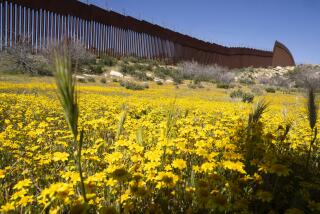Mexican Plants Seen Creating Jobs in U. S.
The opening of the Otay Mesa border station in January, 1985, not only took pressure off the San Ysidro crossing--the busiest in the world--it redirected the pattern of industrial development in San Diego County’s South Bay.
Otay Mesa, an isolated agricultural area best known for Brown Field airport and as a popular route for illegal aliens, was opened up for industrial development, especially “twin plant” or maquiladora industries.
Strongly supported by the Mexican government, the two-decade-old maquiladora industry is now the fastest-growing sector of the Mexican economy, employing about 280,000 people directly, according to John Sartori of Sarco International, a Newport Beach-based consulting firm on the maquiladora industry.
Rather than taking jobs away from American workers, he estimates that every employee in a maquiladora results in one to 2 1/2 jobs in the United States.
Search for Workers
“Because of increasing global competition, companies must look worldwide for at least a portion of their work force,” Sartori said.
“If a company establishes a plant in Mexico, about 90% of its parts and services support come from the United States. If a company goes overseas for labor, 99% of the supply and service jobs are lost to the U.S.”
There are about 1,000 maquiladora companies operating in Mexico, with 95% located in an area adjacent to the United States border, he said.
The 300 or so maquiladora companies in Tijuana employ about 35,000 people, well under the 77,000 employed in Ciudad Juarez, across from El Paso, but Tijuana is targeted as the area of greatest growth potential, Sartori said.
Most Plants in Tijuana
Nearly half of the maquiladora permits issued during the first half of 1986 were for Tijuana maquiladora companies, he said. The proximity of the city of 1.5 million to Far East parts sources, along with the new border crossing are cited as reasons for the rapid growth of maquiladoras in Tijuana.
Maquiladoras import equipment, supplies, raw material or machinery for partial assembly, shipping the goods to the United States for finishing, packaging, warehousing and sales.
In some cases, partially finished goods are sent from the United State to Mexico for finishing.
The program was initiated in the wake of high Mexican unemployment following the termination of the bracero farm worker program in 1964.
Fortune 500 Companies
Mexican laws were modified to allow maquiladora companies to be 100% foreign-owned, although ownership of the land under the plant in border or coastal areas is limited to Mexican citizens, according to Sean P. Doyle of the downtown San Diego office of Coldwell Banker Commercial Real Estate Services.
Among the Fortune 500 companies participating in the program are General Electric, with 16 plants and 20,000 employees. Also participating are RCA, American Hospital Supply Corp., Rockwell, Zenith, Hughes Aircraft and Beckman Instruments.
Mexicali, the state capital of Baja California Norte, is becoming another popular maquiladora site, especially for firms that need abundant supplies of low-cost electrical power, Doyle said.
Rockwell recently completed a $15-million semiconductor assembly plant in Mexicali, a city of about 650,000 about 120 miles east of Tijuana.
“The labor force in the Mexicali market is well educated, and land costs are well under Tijuana prices, making the area ideal for electronic and automotive industries,” Doyle said.
More to Read
Inside the business of entertainment
The Wide Shot brings you news, analysis and insights on everything from streaming wars to production — and what it all means for the future.
You may occasionally receive promotional content from the Los Angeles Times.










